Great changes in Open Al: changes in switching to for-profit and personnel changes

OpenAI, the SAN Francisco-based artificial intelligence company best known for products like ChatGPT, may soon transition from a nonprofit to a traditional corporate structure. The move would mark a major shift in its operational focus, aligning it more closely with shareholder interests.
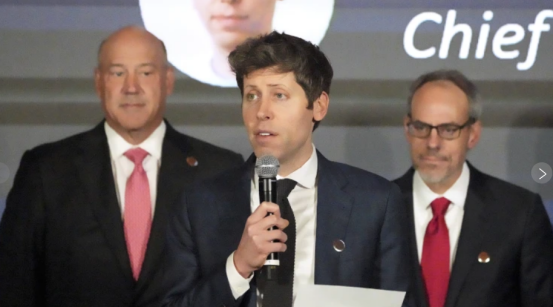
In addition, the artificial intelligence giant Open AI also experienced major personnel changes and potential restructuring, several company executives announced their departure, and the company's leadership experienced a large-scale reorganization, which caused widespread concern in the industry. OpenAI Chief Executive Sam Altman acknowledged in public comments at a technology conference in Italy that the company was considering a restructuring, but insisted that recent high-profile executive resignations had nothing to do with the potential change. These changes could mark a new phase in OpenAI's development.
Open AI could switch to for-profit
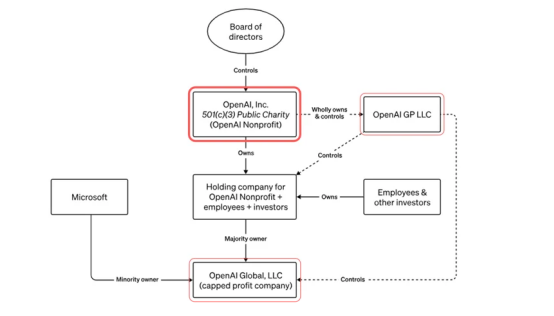
Open AIstarted as a non-profit institution with the aim of promoting and developing friendly artificial intelligence for the benefit of humanity as a whole. The group said it would "freely collaborate" with other institutions and researchers by making its patents and research available to the public. OpenAI, Inc., a non-profit organization, is the sole controlling shareholder of OpenAI Global, LLC, and although OpenAI Global, LLC is a for-profit company, it still has a significant interest in OpenAI, Inc. The non-profit charter has formal fiduciary responsibilities. A majority of OpenAI, Inc. 's board of directors is prohibited from owning shares of OpenAI Global, LLC.
OpenAI's history as a nonprofit research organization and selling commercial products like ChatGPT may be coming to an end, however, as the San Francisco company looks to more fully transform itself into a for-profit company accountable to shareholders. According to a source familiar with the discussions but not authorized to speak publicly on the matter, the AI company's board is considering turning OpenAI into a for-profit company that is no longer under the control of a nonprofit board. Additionally, OpenAI is in discussions to give CEO Sam Altman a 7 percent stake in the company, a major shift that would mark the first time Altman has taken ownership of the AI startup.
According to reports, OpenAI plans to aggressively raise monthly fees within five years, increasing the monthly subscription fee of ChatGPT to a maximum of \$44, which is taking a step in the transition from a nonprofit company to a for-profit company. Compared with other ai tools, such as XXAI a mixed multi-model, a month only need 9,9 yuan AI tools, XXAI price will actually have a greater competitive advantage.
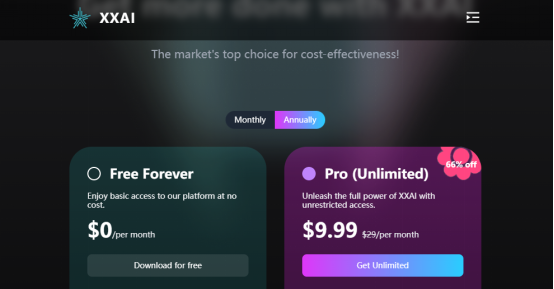
Outside views on open ai's transformation into a for-profit organization

According to Vox, OpenAI no longer exists! OpenAI's founding team has always emphasized that their top priority is to ensure that AI can be developed safely and beneficially. But now it's turning into a for-profit company - Altman sold us all out.
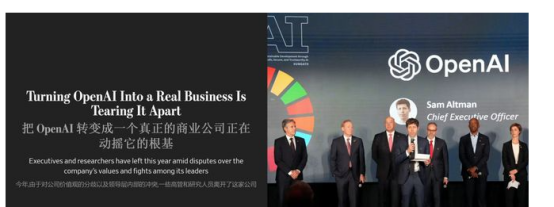
According to WSJ, the business that really makes money for OpenAI is tearing it apart.
In summary, it seems that everyone is not very satisfied with this change.
Open Al personnel changes: The company is facing a major restructuring and senior executives are leaving
1.OpenAI CTO Mira Murati announced her departure in a post on Twitter
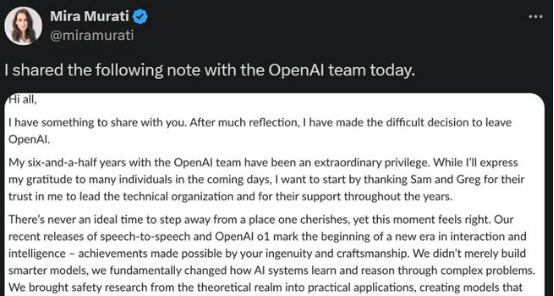
"After much consideration, I have made the difficult decision to leave OpenAI in order to have the time and space to pursue my own exploration," Murati said, adding that her top priority is to work to ensure a smooth transition.
2.Bob McGrew decided it was time to rest
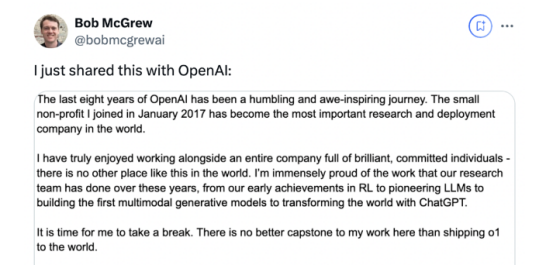
Bob McGrew enjoyed working with a group of smart and dedicated colleagues. He is extremely proud of the team's work over the years, from early achievements in reinforcement learning, to pioneering large-scale language models, to building the first multimodal generation model, and finally changing the world with ChatGPT. Now it's time to rest.
3.Barret Zoph announced his departure
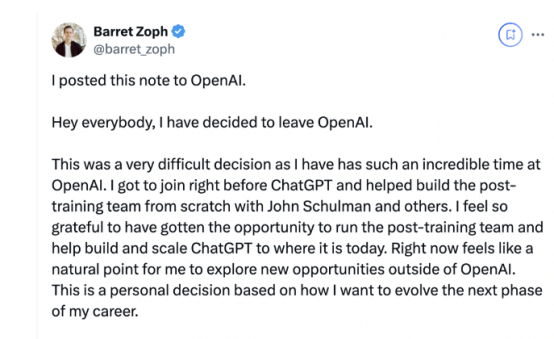
Barret Zoph said it seemed like the right time for him to explore new opportunities outside of OpenAI. It was a decision based on his personal career development needs.
Potential factors for personnel changes
1.OpenAI is about to become a commercial company, and there is a fierce internal conflict of ideas
Since Altman returned as CEO last November, OpenAI has gradually evolved into a commercial company. OpenAI is also increasingly focused on expanding its product line, which some longtime employees say has made its research focus suffer. And cash infusions and the prospect of huge profits have corrupted OpenAI's culture.
2. The company prioritizes product delivery over its original mission
Preliminary results based on incomplete data show that GPT-4o is safe enough to deploy. But after the model was launched, people familiar with the project said that subsequent analysis found that the model exceeded OpenAI's internal standards for persuasiveness. The security team raised the issue with OpenAI executives and is committed to resolving it. If companies had spent more time on security testing, problems could have been solved before they reached users.
3. There are problems with the management style
Altman's management style has been criticized, making relevant personnel unhappy. His tendency is to perpetuate internal strife, to the detriment of OpenAI, and to the detriment of employee morale.
4. The work pressure is high, and the core employees ask for higher salary
Launching products on short notice, working nights and weekends. Employees who work with leaders like Murati and McGrew also say the pressures are overwhelming.
Is the loss of openai technical talent related to the reorganization of enterprises?

OpenAI CEO Sam Altman said the recent departures of top executives such as Chief Technology Officer Mira Murati and chief research Officer Bob McGrew were not related to the company's restructuring. While the leadership exodus is continuing, Altman said in a new interview that OpenAI will get stronger.
However, the public did not approve of this statement, and most people speculated that there was a strong correlation between the two.
Conclusion
Recently, the OpenAI company has undergone a major change, which has quickly triggered widespread attention and discussion in the industry. In this change, the internal personnel adjustment became the focus, and everyone showed great interest and attention to the changes in the core team of OpenAI. Industry experts, media and related practitioners have expressed their views and opinions that these personnel changes may have a significant impact on the company's operational efficiency and innovation ability. At the same time, as OpenAI adjusts its business strategy and direction, many people have offered their own insights and predictions on the nature of the company's business changes, exploring the possible long-term impact of such changes, and the potential effect on the overall landscape of the AI industry.